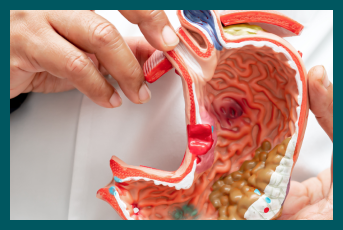Gastro incubation period
Written by Dr Nelson Lau, MBBS FRACGP, GP & Digital Health Specialist. Blog updated on 24 October,2025. Originally published on 04 May February, 2024.

Contents

Overview
Gastroenteritis (or “gastro”) is an infection that causes inflammation in your stomach and intestines. It can hit quickly — but there’s often an incubation period before symptoms appear. The period between bug exposure and illness onset makes up this stage.Types of gastro
- Viral gastro: Caused by viruses like norovirus or rotavirus — spreads easily and is the most common type in Australia. The bacterial gastro condition develops when Salmonella or E. coli bacteria infect food that has not been properly cooked or remains contaminated.
- Parasitic gastro: The condition occurs rarely because of parasite infections from Giardia which spread through contaminated water and unsanitary conditions.
Cause & incubation period
| Type of Gastro | Common Cause | Incubation Period |
| Norovirus | Contaminated food, water, or surfaces | 12–48 hours |
| Rotavirus | Contact with infected people or surfaces | 1–3 days |
| Salmonella | Undercooked eggs, meat, or poultry | 6–72 hours |
| E. coli | Contaminated food or water | 1–10 days |
| Giardia | Contaminated water or person-to-person contact | 7–14 days |
What happens during the incubation period?
During this time, the virus or bacteria multiplies quietly in your gut. The infection inside you continues to grow even though you feel okay because it will eventually trigger nausea and cramps and diarrhoea symptoms. Some individuals begin transmitting germs before they develop any symptoms of illness.How long does it take to get gastroenteritis after exposure?
The incubation period for gastroenteritis—meaning the time between exposure to the pathogen and the appearance of symptoms—varies according to the cause:- Viral gastroenteritis (norovirus or rotavirus): Symptoms typically develop 12 to 48 hours after exposure.
- Bacterial gastroenteritis (e.g., Salmonella or E. coli): Symptoms typically develop 1 to 3 days after consuming infected food or water, though some bacteria, such as Clostridium perfringens, may cause symptoms within 6 to 12 hours.
- Parasitic infections (e.g., Giardia): Symptoms may take 1 to 2 weeks to present.
Timeline for gastro
The course of a typical case of gastroenteritis is as follows:- Incubation period: The pathogen reproduces in the digestive system, but symptoms are not yet noticeable.
- Onset of symptoms: Nausea, vomiting, diarrhoea, or abdominal cramps signal the start of the illness. Fever and body aches may follow.
- Acute phase: Symptoms peak during this stage. Viral gastroenteritis typically lasts 1–3 days, while bacterial and parasitic infections can persist longer (up to 10 days or more).
- Recovery: Dehydration resolves as fluid intake resumes, though fatigue and loose stools may linger for a few days.
Severity in children, adults, and older people
| Group | Severity | Why It Differs |
| Children | Often more severe | Smaller bodies lose fluids faster — higher dehydration risk |
| Adults | Usually moderate | Healthy immune systems can recover quicker |
| Older adults | Can be serious | Weaker immunity and existing health issues slow recovery |
Symptoms and signs
In adults
During the incubation period, symptoms are minimal or absent, but subtle signs may include:- Slight bloating or gas
- Mild stomach discomfort
- Fatigue or a general sense of unease
In children
For children, the incubation phase is usually asymptomatic. However, you may notice:- Reduced appetite
- Fussiness or clinginess
- Complaints of “tummy aches”
Experiencing these symptoms? Speak with a doctor within 15 minutes.
See a Doctor now
Available 24/7, across Australia.
When are you most contagious?
People are most contagious during the first 2–3 days of symptoms, especially with viral gastro. The virus continues to spread through the air for multiple days following when patients finish showing their symptoms. Good hygiene — washing hands and cleaning surfaces — is essential to stop it spreading.Preventive measures
Adults
- Wash hands with soap and water after using the bathroom, handling food, or gardening.
- Prevent cross-contamination by separating raw food from cooked food.
- Drink only clean or filtered water when traveling.
Children
- Teach children to wash their hands before eating and after playing outside.
- Clean and disinfect shared toys.
- Keep vaccinations, such as the rotavirus vaccine, up to date.
General tips
- Avoid food from unreliable sources.
- Disinfect frequently touched surfaces (e.g., doorknobs, countertops) to prevent spreading illness.
- Stay home if feeling unwell.
Gastroenteritis complications
Gastroenteritis can cause complications, particularly in at-risk groups:- Dehydration: Symptoms include dizziness, dry mouth, reduced urination, and, in extreme cases, organ failure.
- Electrolyte imbalance: Loss of potassium, sodium, and other electrolytes can affect heart and nerve function.
- Malnutrition: Prolonged illness may reduce nutrient absorption, especially in children.
- Sepsis: Rare but possible if bacterial infections become systemic.
Who is at risk?
Certain groups are at greater risk for severe gastroenteritis:- Infants and young children: Their developing immune systems and smaller bodies make dehydration more severe.
- Older adults: Aging immune systems and underlying conditions can slow recovery.
- Immunocompromised individuals: People undergoing chemotherapy or with conditions like HIV are at increased risk.
- Travelers: Exposure to new pathogens can result in “traveller’s diarrhoea.”
Treatment options
Medical treatment
- Electrolyte powders (e.g., oral rehydration solutions or ORS): Replenish lost fluids and electrolytes.
- Antivirals: For some viral infections, such as rotavirus.
- Antibiotics: Effective for bacterial gastroenteritis but may worsen certain infections (e.g., E. coli).
- Antiparasitic drugs: For parasitic infections, such as Giardia.
Home remedies
- Hydrate: Drink clear liquids like water, broth, or diluted fruit juice. Avoid caffeinated drinks.
- Go bland: Start with the BRAT diet (bananas, rice, applesauce, toast) once nausea subsides.
- Ginger tea: Helps ease nausea.
- Probiotics: Found in yogurt or supplements, they aid in gut healing.
When to seek doctor’s appointment?
Seek medical care if you or your child experiences:- Vomiting for more than 2 days
- High fever (38.9°C or above in adults, 38°C in infants)
- Blood in stool or vomit
- Severe dehydration signs such as confusion, rapid heartbeat, or sunken eyes
Children’s warning signs
- Crying without tears
- No wet diaper for 6 hours or longer
- Extreme fatigue or agitation
How can telehealth help?
Telehealth provides valuable support for gastroenteritis treatment:- Initial evaluation: Remote assessment of symptoms and guidance on next steps.
- Prescriptions: Medications prescribed without an in-person visit, benefiting vulnerable patients.
- Educational guidance: Advice on hydration, home remedies, and when to seek higher care.
- Follow-ups: Easy monitoring of recovery progress.
How can Hola Health help?
Gastroenteritis can leave you feeling weak, dehydrated, and unfit for work or daily activities. With Hola Health’s 24/7 telehealth service, you can access on-demand doctors anytime for quick medical support, including:- Medical certificates & multi-day sick notes – If gastro symptoms prevent you from working or studying, Get medical certificate online or multi-day medical certificate for recovery.
- Instant scripts online – Get online prescriptions and other symptom relief, delivered directly to your phone.
- Telehealth consultations – Speak to a licensed GP online within minutes for professional advice on managing symptoms and preventing complications.
- Online doctor referrals – If further tests or specialist care are required, our AHPRA-accredited Australian doctors or health practitioners can provide pathology, radiology, or specialist referrals online.
Conclusion
While gastroenteritis is common, understanding its incubation period, symptoms, and treatments can speed recovery and prevent complications. Maintain good hygiene, stay hydrated, and consult medical professionals for persistent or severe symptoms. Telehealth offers a convenient and effective way to manage this condition from the comfort of your home.Frequently Asked Questions
How soon after eating bad food can gastro start?
The onset of infection occurs between 6 hours and several days based on the specific pathogen causing the illness.Can you spread gastro before symptoms appear?
Yes. The body releases viral and bacterial germs through shedding before any symptoms become visible.How long should I stay home after gastro?
- The duration of home rest following gastroenteritis infection depends on individual factors and the severity of symptoms.
- The Centers for Disease Control and Prevention (CDC) recommends that patients should remain at home until they have not had any diarrhoea or vomiting episodes for 48 hours. The healing process of the body requires this time period which also stops the transmission of infection to others.
- The duration of rest depends on whether a person shows fever symptoms or dehydration or displays severe illness symptoms.
- People need to consult with a doctor to find out when they can safely return to their normal activities.
- Stay home until you have been symptom-free for at least 48 hours because this helps stop the spread of the illness.
What’s the difference between viral and bacterial gastro?
- Viral gastro spreads easily from person to person and usually clears within a few days.
- Bacterial gastro is often from contaminated food and may need medical care if severe.
When should I worry about dehydration?
The risk of dehydration becomes critical when my symptoms become severe enough to stop me from doing my daily activities. The body shows dehydration through three main symptoms which include dark yellow or brown urine and decreased urine output, and dry mouth. You should visit a doctor immediately when you experience any of these symptoms: inability to keep fluids down or dry lips or dizziness or reduced urine output. Children and older adults are at the highest risk.Need time off to recover? Get your medical certificate online within 15 minutes.
Request a medical certificate
Available 24/7, across Australia.
What we treat
- Cough
- Nausea & vomiting
- Fever
- Hayfever
- Fatigue
- Sore throat
- Acne
- Hair loss
- Gout
- Eczema
- Rosacea
- Sunburn
- UTI
- Erectile dysfunction
- Contraception
- Morning sickness
- Morning after pill
- Prostate health
- Anxiety
- Depression
- Stress
- Grief & loss
- Antidepressants
- Premature ejaculation
- Asthma
- Blood pressure
- Blood thinners
- Diabetes
- Cholesterol
- Migraines & headaches
- Allergies
- Body ache
- Heartburn & reflux
- Sleep disorder
- Pain relief
- Gastro
Related Articles
Disclaimer
This blog is for general informational purposes only and does not indicate that Hola Health provides all treatments or preventive measures mentioned. It is not intended to be a substitute for professional medical advice. Always seek the guidance of your doctor or other qualified health professional with any questions you may have regarding your health or a medical condition. For emergencies please immediately contact 000. Any medical topics discussed are intended to educate, not to imply availability through Hola Health.
 Facebook
Facebook  X
X  Copy Link
Copy Link



